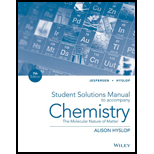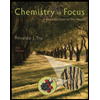
EBK STUDY GUIDE TO ACCOMPANY CHEMISTRY:
7th Edition
ISBN: 9781119360889
Author: HYSLOP
Publisher: VST
expand_more
expand_more
format_list_bulleted
Question
Chapter 22, Problem 81RQ
Interpretation Introduction
Interpretation:
The most lethal chemical poison is to be determined with an example.
Concept Information:
Poisons cause the disruption in the
Poisons can be industrial pollutants, gases, pesticides or insecticides used in agriculture filed, heavy metals accumulated in the food chain or toxins produced by the bacteria. Toxins are poisons, which are synthesized by organisms.
Expert Solution & Answer
Want to see the full answer?
Check out a sample textbook solution
Students have asked these similar questions
Identifying electron-donating and
For each of the substituted benzene molecules below, determine the inductive and resonance effects the substituent will have on the
benzene ring, as well as the overall electron-density of the ring compared to unsubstituted benzene.
Molecule
Inductive Effects
NH2
○ donating
NO2
Explanation
Check
withdrawing
no inductive effects
Resonance Effects
Overall Electron-Density
○ donating
O withdrawing
O no resonance effects
O donating
O withdrawing
O donating
withdrawing
O no inductive effects
Ono resonance effects
O electron-rich
electron-deficient
O similar to benzene
O electron-rich
O electron-deficient
O similar to benzene
olo
18
Ar
2025 McGraw Hill LLC. All Rights Reserved. Terms of Use | Privacy Center | Accessibility
Rank each of the following substituted benzene molecules in order of which will react fastest (1) to slowest (4) by electrophilic
aromatic substitution.
Explanation
Check
Х
(Choose one)
OH
(Choose one)
OCH3
(Choose one)
OH
(Choose one)
© 2025 McGraw Hill LLC. All Rights Reserved. Terms of Use | Privacy Center
Assign R or S to all the chiral centers in each compound drawn below
porat
bg
9
Br
Br
Chapter 22 Solutions
EBK STUDY GUIDE TO ACCOMPANY CHEMISTRY:
Ch. 22 - Prob. 1PECh. 22 - Prob. 2PECh. 22 - Prob. 3PECh. 22 - Practice Exercise 22.4
Write the IUPAC names of...Ch. 22 - Oxidation of an alcohol gave the following...Ch. 22 - Prob. 6PECh. 22 - Prob. 7PECh. 22 - Prob. 8PECh. 22 - Prob. 9PECh. 22 - Prob. 10PE
Ch. 22 - Complete the following equation by drawing...Ch. 22 - Prob. 12PECh. 22 - Prob. 13PECh. 22 - Prob. 14PECh. 22 - Prob. 15PECh. 22 - Label the hydrophobic and hydrophilic portions of...Ch. 22 - Draw a ribose ring and a deoxyribose ring. What is...Ch. 22 - Practice Exercise 22.18
Which base pairs match in...Ch. 22 - Prob. 1RQCh. 22 - Prob. 2RQCh. 22 - Prob. 3RQCh. 22 - Prob. 4RQCh. 22 - Prob. 5RQCh. 22 - Prob. 6RQCh. 22 - Prob. 7RQCh. 22 - Which of the following compounds has the higher...Ch. 22 - In general terms, why do functional groups impart...Ch. 22 - Prob. 10RQCh. 22 - What is the difference between geometric isomers...Ch. 22 - Prob. 12RQCh. 22 - No number is needed to identify the location of...Ch. 22 - Prob. 14RQCh. 22 - Prob. 15RQCh. 22 - Prob. 16RQCh. 22 - 22.17 In general terms, why doesn't benzene...Ch. 22 - Prob. 18RQCh. 22 - 22.19 Explain why is more soluble in water than ....Ch. 22 - Prob. 20RQCh. 22 - Prob. 21RQCh. 22 - Why do aldehydes and ketones have boiling points...Ch. 22 - Acetic acid boils at 118C, higher even than...Ch. 22 - Methyl ethanoate has many more atoms than its...Ch. 22 - Prob. 25RQCh. 22 - 22.26 Write condensed structures of the following...Ch. 22 - 3-Butanol is not a proper name, but a structure...Ch. 22 - Prob. 28RQCh. 22 - Prob. 29RQCh. 22 - Prob. 30RQCh. 22 - Prob. 31RQCh. 22 - Prob. 32RQCh. 22 - Amines, RNH2, do not have boiling points as high...Ch. 22 - A monofunctional organic nitrogen compound...Ch. 22 - Prob. 35RQCh. 22 - Prob. 36RQCh. 22 - Prob. 37RQCh. 22 - Write the products that can be expected to form in...Ch. 22 - Prob. 39RQCh. 22 - Prob. 40RQCh. 22 - 22.41 What do we mean by the term polymer...Ch. 22 - Prob. 42RQCh. 22 - Prob. 43RQCh. 22 - Prob. 44RQCh. 22 - Prob. 45RQCh. 22 - Prob. 46RQCh. 22 - Prob. 47RQCh. 22 - Prob. 48RQCh. 22 - Prob. 49RQCh. 22 - Prob. 50RQCh. 22 - Prob. 51RQCh. 22 - Prob. 52RQCh. 22 - Prob. 53RQCh. 22 - Prob. 54RQCh. 22 - Prob. 55RQCh. 22 - Prob. 56RQCh. 22 - Prob. 57RQCh. 22 - Prob. 58RQCh. 22 - What are the three fundamental needs for...Ch. 22 - Prob. 60RQCh. 22 - Prob. 61RQCh. 22 - Prob. 62RQCh. 22 - Name the compounds that form when sucrose is...Ch. 22 - Prob. 64RQCh. 22 - Prob. 65RQCh. 22 - Prob. 66RQCh. 22 - Prob. 67RQCh. 22 - 22.68 What function is served by glycogen in the...Ch. 22 - How are lipids defined?Ch. 22 - Why are lipids more soluble than carbohydrates in...Ch. 22 - 22.71 Cholesterol is not an ester, yet it is...Ch. 22 - A product such as corn oil is advertised as...Ch. 22 - Is it likely that the following compound could be...Ch. 22 - Describe the specific ways in which the monomers...Ch. 22 - What is the peptide bond? How is it similar to the...Ch. 22 - Prob. 76RQCh. 22 - Prob. 77RQCh. 22 - Why is a distinction made between the terms...Ch. 22 - Prob. 79RQCh. 22 - What kind of substance makes up most enzymes?Ch. 22 - Prob. 81RQCh. 22 - Prob. 82RQCh. 22 - Prob. 83RQCh. 22 - 22.84 How are the two DNA strands in a double...Ch. 22 - In what ways do DNA and RNA differ structurally.Ch. 22 - 22.86 Which base pairs with
Ch. 22 - The process of transcription begins with which...Ch. 22 - The process of translation begins with which...Ch. 22 - Prob. 89RQCh. 22 - 22.90 Write full (expanded) structures for each of...Ch. 22 - Prob. 91RQCh. 22 - Prob. 92RQCh. 22 - Prob. 93RQCh. 22 - Prob. 94RQCh. 22 - Prob. 95RQCh. 22 - Prob. 96RQCh. 22 - Prob. 97RQCh. 22 - Prob. 98RQCh. 22 - Prob. 99RQCh. 22 - Prob. 100RQCh. 22 - Prob. 101RQCh. 22 - 22.102 Write the structures of the cis and tram...Ch. 22 - 22.103 Write the structures of the products that...Ch. 22 - Prob. 104RQCh. 22 - 22.105 Repeat Problem 22.103 using...Ch. 22 - Repeat Problem 22.104 using cyclohexene. The...Ch. 22 - Prob. 107RQCh. 22 - Predict the products of the reaction of benzene...Ch. 22 - Prob. 109RQCh. 22 - Prob. 110RQCh. 22 - Prob. 111RQCh. 22 - Prob. 112RQCh. 22 - Prob. 113RQCh. 22 - Write the structure of the product of the...Ch. 22 - Prob. 115RQCh. 22 - Prob. 116RQCh. 22 - Prob. 117RQCh. 22 - Prob. 118RQCh. 22 - Prob. 119RQCh. 22 - Prob. 120RQCh. 22 - Prob. 121RQCh. 22 - Write the structures of the products that form in...Ch. 22 - Prob. 123RQCh. 22 - Prob. 124RQCh. 22 - Prob. 125RQCh. 22 - Prob. 126RQCh. 22 - Prob. 127RQCh. 22 - Prob. 128RQCh. 22 - 22.129 Write the structure of a triacylglycerol...Ch. 22 - 22.130 Write the structures of the products of the...Ch. 22 - Write the structure of the triacylglycerol that...Ch. 22 - *22.132 If the compound in Problem 22.130 is...Ch. 22 - *22.133 What parts of glyccrophospholipid...Ch. 22 - *22.134 In general terms, describe the structure...Ch. 22 - Prob. 135RQCh. 22 - What is the structure of the tripeptide that could...Ch. 22 - 22.137 What are the structures of the two...Ch. 22 - Prob. 138RQCh. 22 - Prob. 139RQCh. 22 - Prob. 140RQCh. 22 - Prob. 141RQCh. 22 - 22.142 Suggest a reason why trimethylamine, , has...Ch. 22 - Prob. 143RQCh. 22 - How many tripeptides can be made from three...Ch. 22 - Prob. 145RQCh. 22 - Prob. 146RQCh. 22 - Estimate the number of kilojoules of heat that...Ch. 22 - Prob. 148RQCh. 22 - Prob. 149RQCh. 22 - The compound that causes your eyes to water when...Ch. 22 - Prob. 151RQCh. 22 - Prob. 152RQCh. 22 - Use resonance structures to explain why urea,...Ch. 22 - Prob. 154RQCh. 22 - Prob. 155RQ
Knowledge Booster
Similar questions
- (c) (4pts) Mechanism: heat (E1) CH3OH + 1.5pts each _E1 _ (1pt) Br CH3OH (d) (4pts) Mechanism: SN1 (1pt) (e) (3pts) 1111 I H 10 Ill!! H LDA THF (solvent) Mechanism: E2 (1pt) NC (f) Bri!!!!! CH3 NaCN (3pts) acetone Mechanism: SN2 (1pt) (SN1) -OCH3 OCH3 1.5pts each 2pts for either product 1pt if incorrect stereochemistry H Br (g) “,、 (3pts) H CH3OH +21 Mechanism: SN2 (1pt) H CH3 2pts 1pt if incorrect stereochemistry H 2pts 1pt if incorrect stereochemistryarrow_forwardA mixture of butyl acrylate and 4'-chloropropiophenone has been taken for proton NMR analysis. Based on this proton NMR, determine the relative percentage of each compound in the mixturearrow_forwardQ5: Label each chiral carbon in the following molecules as R or S. Make sure the stereocenter to which each of your R/S assignments belong is perfectly clear to the grader. (8pts) R OCH 3 CI H S 2pts for each R/S HO R H !!! I OH CI HN CI R Harrow_forward
arrow_back_ios
SEE MORE QUESTIONS
arrow_forward_ios
Recommended textbooks for you
 Living By Chemistry: First Edition TextbookChemistryISBN:9781559539418Author:Angelica StacyPublisher:MAC HIGHER
Living By Chemistry: First Edition TextbookChemistryISBN:9781559539418Author:Angelica StacyPublisher:MAC HIGHER Principles of Modern ChemistryChemistryISBN:9781305079113Author:David W. Oxtoby, H. Pat Gillis, Laurie J. ButlerPublisher:Cengage Learning
Principles of Modern ChemistryChemistryISBN:9781305079113Author:David W. Oxtoby, H. Pat Gillis, Laurie J. ButlerPublisher:Cengage Learning World of Chemistry, 3rd editionChemistryISBN:9781133109655Author:Steven S. Zumdahl, Susan L. Zumdahl, Donald J. DeCostePublisher:Brooks / Cole / Cengage Learning
World of Chemistry, 3rd editionChemistryISBN:9781133109655Author:Steven S. Zumdahl, Susan L. Zumdahl, Donald J. DeCostePublisher:Brooks / Cole / Cengage Learning World of ChemistryChemistryISBN:9780618562763Author:Steven S. ZumdahlPublisher:Houghton Mifflin College Div
World of ChemistryChemistryISBN:9780618562763Author:Steven S. ZumdahlPublisher:Houghton Mifflin College Div Chemistry In FocusChemistryISBN:9781305084476Author:Tro, Nivaldo J., Neu, Don.Publisher:Cengage LearningChemistry: Matter and ChangeChemistryISBN:9780078746376Author:Dinah Zike, Laurel Dingrando, Nicholas Hainen, Cheryl WistromPublisher:Glencoe/McGraw-Hill School Pub Co
Chemistry In FocusChemistryISBN:9781305084476Author:Tro, Nivaldo J., Neu, Don.Publisher:Cengage LearningChemistry: Matter and ChangeChemistryISBN:9780078746376Author:Dinah Zike, Laurel Dingrando, Nicholas Hainen, Cheryl WistromPublisher:Glencoe/McGraw-Hill School Pub Co

Living By Chemistry: First Edition Textbook
Chemistry
ISBN:9781559539418
Author:Angelica Stacy
Publisher:MAC HIGHER

Principles of Modern Chemistry
Chemistry
ISBN:9781305079113
Author:David W. Oxtoby, H. Pat Gillis, Laurie J. Butler
Publisher:Cengage Learning

World of Chemistry, 3rd edition
Chemistry
ISBN:9781133109655
Author:Steven S. Zumdahl, Susan L. Zumdahl, Donald J. DeCoste
Publisher:Brooks / Cole / Cengage Learning

World of Chemistry
Chemistry
ISBN:9780618562763
Author:Steven S. Zumdahl
Publisher:Houghton Mifflin College Div

Chemistry In Focus
Chemistry
ISBN:9781305084476
Author:Tro, Nivaldo J., Neu, Don.
Publisher:Cengage Learning

Chemistry: Matter and Change
Chemistry
ISBN:9780078746376
Author:Dinah Zike, Laurel Dingrando, Nicholas Hainen, Cheryl Wistrom
Publisher:Glencoe/McGraw-Hill School Pub Co